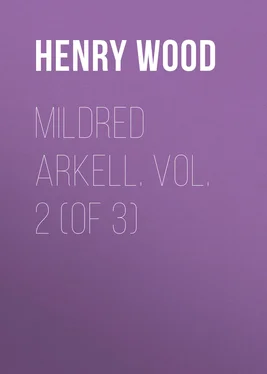Henry Wood - Mildred Arkell. Vol. 2 (of 3)
Здесь есть возможность читать онлайн «Henry Wood - Mildred Arkell. Vol. 2 (of 3)» — ознакомительный отрывок электронной книги совершенно бесплатно, а после прочтения отрывка купить полную версию. В некоторых случаях можно слушать аудио, скачать через торрент в формате fb2 и присутствует краткое содержание. Жанр: foreign_sf, literature_19, foreign_antique, foreign_prose, на английском языке. Описание произведения, (предисловие) а так же отзывы посетителей доступны на портале библиотеки ЛибКат.
- Название:Mildred Arkell. Vol. 2 (of 3)
- Автор:
- Жанр:
- Год:неизвестен
- ISBN:нет данных
- Рейтинг книги:4 / 5. Голосов: 1
-
Избранное:Добавить в избранное
- Отзывы:
-
Ваша оценка:
- 80
- 1
- 2
- 3
- 4
- 5
Mildred Arkell. Vol. 2 (of 3): краткое содержание, описание и аннотация
Предлагаем к чтению аннотацию, описание, краткое содержание или предисловие (зависит от того, что написал сам автор книги «Mildred Arkell. Vol. 2 (of 3)»). Если вы не нашли необходимую информацию о книге — напишите в комментариях, мы постараемся отыскать её.
Mildred Arkell. Vol. 2 (of 3) — читать онлайн ознакомительный отрывок
Ниже представлен текст книги, разбитый по страницам. Система сохранения места последней прочитанной страницы, позволяет с удобством читать онлайн бесплатно книгу «Mildred Arkell. Vol. 2 (of 3)», без необходимости каждый раз заново искать на чём Вы остановились. Поставьте закладку, и сможете в любой момент перейти на страницу, на которой закончили чтение.
Интервал:
Закладка:
They descended to the great salle a little before ten. Many groups were breakfasting there at the long tables; most of them English, as might be heard by their snatches of quiet conversation. Some of them possessed an air of distinction and refinement that bespoke their standing in society. An English servant came in once and accosted his master as "my lord;" and a plain little body in a black silk gown and white net cap, was once spoken to as "Lady Jane." Mr. Dundyke had never, to the best of his knowledge, been in a room with a lord before; had never but once set eyes on a Lady Jane; and that was King Henry the Eighth's wife in waxwork; and, alive to his own importance though the common-councilman was, he felt unpleasantly out of place amidst them. In spite of his ambition his nature was a modest one.
Scarcely had he and his wife begun breakfast, when a lady and gentleman came in and took the seats next to him. The stranger was a tall, dark, rather handsome man; taller than Mr. Dundyke, who was by no means undersized, and approaching within three or four years to the same age. But while the common councilman was beginning to get rather round and puffy, just as an embryo alderman is expected to be, the stranger's form was remarkable for wiry strength and muscle: in a tussle for life or death, mark you, reader, the one would be a very child in the handling of the other.
Mr. Dundyke moved his chair a little to give more room, as they sat down, and the gentleman acknowledged it with a slight bow of courtesy. He spoke soon after.
"If you are not using that newspaper, sir," pointing to one that lay near Mr. Dundyke, "may I trouble you for it?"
"No use to me, sir," said the common-councilman, passing the journal. "I understand French pretty well when it's spoke, but am scarcely scholar enough in the language to read it."
"Ah, indeed," replied the stranger. "This, however, is German," he continued, as he opened the paper.
"Oh—well—they look sufficiently alike in print," observed the common-councilman. "Slap-up hotel, this seems, sir."
"Comfortable," returned the stranger, carelessly. "You are a recent arrival, I think."
"Got here last night, sir, by the diligence. We are travelling on pleasure; taking a holiday."
"There's nothing like an occasional holiday, a temporary relaxation from the cares of business," remarked the stranger, scanning covertly Mr. Dundyke. "As I often say."
"I am delighted to hear you say it, sir," exclaimed the common-councilman, hastily assuming a fact, from the words, which probably the speaker never thought to convey. "I am in business myself, sir, and this is the first holiday from it I have ever took: I gather that you are the same. Nothing so respectable as commercial pursuits: a London merchant, sir, stands as a prince of the world."
"Respectable and satisfactory both," joined in the stranger. "What branch of commerce—if you don't deem me impertinent—may you happen to pursue?"
"I'm a partner in a wholesale tea-house, sir," cried Mr. Dundyke, flourishing his hand and his ring for the stranger's benefit. "Our establishment is one of the oldest and wealthiest in Fenchurch-street; known all over the world, sir, and across the seas from here to Chinar. And as respected as it is known."
"Sir, allow me to shake hands with you," exclaimed the stranger, warmly. "To be a member of such a house does you honour."
"And I am a common-councilman," continued Mr. Dundyke, his revelations increasing with his satisfaction, "rising on fast to be a alderman and Lord Mayor. No paltry dignity that, sir, to be chief magistrate of the city of London, and ride to court in a gold and scarlet dress, and broidered ruffles! I suspect we have got some lords round about us here," dropping his voice to a still lower key, "but I'm blest, sir, if I'd change my prospects with any of them. I'm to be put up for sheriff in October."
"Ah," said the stranger, casting his deep black eyes around, "young scions with more debts than brains, long pedigrees and short purses, dealers in post obits and the like— they can't be put in comparison with a Lord Mayor of London."
"And what line are you in, sir?" resumed the gratified Lord Mayor in prospective. "From our great city, of course?"
The stranger nodded, but, before he answered, he finished his second cotelette , poured out some wine—for his breakfast disdained the more effeminate luxuries of tea and coffee—popped a piece of ice in, and drank it. "Have you heard of the house of Hardcastle and Co.?" he asked, in a tone meant only for Mr. Dundyke's ear.
"The East India merchants?" exclaimed the latter.
The stranger nodded again.
"Of course I have heard of them: who has not? A firm of incalculable influence, sir; could buy up half London. What of them?"
"Do you know the partners personally?"
"Never saw any of them in my life," replied Mr. Dundyke. "They are top-sawyers, they are; a move or two above us city tea-folks. Perhaps you have the honour of being a clerk in the house, sir?"
"I am Mr. Hardcastle," observed the stranger, smiling.
"Bless my soul, sir!" cried the startled Mr. Dundyke. "I'm sure I beg pardon for my familiarity. But stop—eh—I thought–"
"Thought what?" asked the stranger, for Mr. Dundyke came to a pause.
"That Mr. Hardcastle was an old man. In fact, the impression on my mind was, that he was something like seventy."
"Pooh, my dear sir! your thoughts are running on my uncle. He has been virtually out of the firm these ten years, though his name is still retained as its head. He is just seventy. A hale, hearty man he is too, and trots about the grounds of his mansion at Kensington as briskly as one of his own gardeners. But not a word here of who I am," continued the gentleman, pointing slightly round the room: "I am travelling quietly, you understand— incog. , if one may say so—travelling without form or expense, in search of a little peace and quietness. I have not a single attendant with me, nor has my wife her maid. Mrs. Hardcastle," he said, leaning back, the better to introduce his wife.
The lady bowed graciously to Mr. and Mrs. Dundyke, and the former, in his flurry to acknowledge the condescension, managed to upset the coffee-pot. Mrs. Dundyke saw a stylish woman of thirty—at least, if a great deal of dress can constitute style. She had a handsome, but deadly pale face, with bold eyes, black as her husband's.
"I feel really glad to make your acquaintance," resumed Mr. Hardcastle. "Standing aloof, as I have purposely done, from the persons of condition staying in the hotel, I had begun to find it slow."
"Sir, I am sure I'm greatly flattered," said Mr. Dundyke. "Have you been long here, sir?"
"About three weeks or a month," replied the gentleman, carelessly. "We shall soon be thinking of going."
Mr. Dundyke did indeed feel flattered, and with reason, for the firm in question was of the very first consideration, and he was overwhelmed with the honour vouchsafed him. "A Lord Mayor might be proud to know him," he exclaimed to his wife, when they got upstairs from the breakfast. "I hope he'll give me his friendship when I am in the Chair."
"I think they have the next room to ours," observed Mrs. Dundyke. "I saw the lady standing at the door there this morning, when I was peeping out, wondering which was the way down to breakfast. Is it not singular they should be travelling in this quiet way, without any signs of their wealth about them?"
"Not at all singular," said the shrewd common-councilman. "They are so overdone with grandeur at home, these rich merchants, with their servants, and state, and ceremony, that it must be a positive relief to get rid of it altogether for a time, and live like ordinary people. I can understand the feeling very well."
Читать дальшеИнтервал:
Закладка:
Похожие книги на «Mildred Arkell. Vol. 2 (of 3)»
Представляем Вашему вниманию похожие книги на «Mildred Arkell. Vol. 2 (of 3)» списком для выбора. Мы отобрали схожую по названию и смыслу литературу в надежде предоставить читателям больше вариантов отыскать новые, интересные, ещё непрочитанные произведения.
Обсуждение, отзывы о книге «Mildred Arkell. Vol. 2 (of 3)» и просто собственные мнения читателей. Оставьте ваши комментарии, напишите, что Вы думаете о произведении, его смысле или главных героях. Укажите что конкретно понравилось, а что нет, и почему Вы так считаете.












